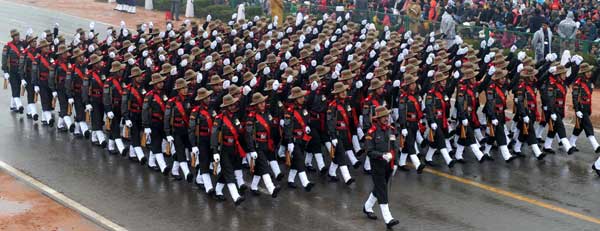
“It is too true, however disgraceful it may be to human nature, that nations in general will make war whenever they have a prospect of getting anything by it.”
— John Jay, The Federalist Papers September 17, 1787.
“You must first enable the government to control the g ..
Read more at:The paramount measure of national power is military capability. Today, countries endure in an environment where internal and external threats to security are both common and ever-present; the effectiveness of the coercive arm becomes the ultimate criteria of power. Capable military’s enable countries to defend themselves against all adversaries, foreign and domestic, while at the same time enabling the government to pursue and protect whatever interests they value, if necessary, over and against .. National power has many components, some tangible, like economic wealth and technical pre-eminence. Other components are intangible – such as moral force, or strong national will. Military forces, when they are strong and ready and modern, are a credible – and tangible – addition to other elements of a nation’s power. When both the intangible national will and those forces are forged into one instrument, national power becomes effective.
Of all the many policies the citizens of a country need to understand, is the use of military power. Deterrence will work only if the adversaries’ understand the nation’s firm commitment to keeping the peace and a well-informed public that can be expected to stand solidly behind its government decision. The first American President, George Washington, enunciated a policy of peace through strength in his fifth annual message to Congress, the 1793 State of the Union Address. He said: “There is a rank due to the United States among nations which will be withheld, if not absolutely lost, by the reputation of weakness. If we desire to avoid insult, we must be able to repel it; if we desire to secure peace, one of the most powerful instruments of our rising prosperity; it must be known that we are at all times ready for war.” The old truism holds good – a strong military is the best guarantee for peace. Peace through strength or if that failed, peace through threat.
Alexander Hamilton, writing in the Federalist Papers (September 1787), said that – “it is impossible to foresee or define the extent and variety of national exigencies, or the correspondent extent and variety of the means which may be necessary to satisfy them”. If it was true then one can fathom the complexity of the geopolitical and strategic environment now. Most leaders today often mention of the complex and dynamic geostrategic environment prevailing. Countries are faced with serious indirect challenges to the peace in a spectrum from border wars to proxy wars onto individual terrorist action. While the use of military force to defend territory has never been questioned when a democracy has been attacked and its very survival threatened, most democracies have rejected the unilateral aggressive use of force to invade, conquer or subjugate other nations. The extent to which the use of force is acceptable remains unresolved for the host of other ..
Read more at:
http://www.indiandefencereview.com/news/resizing-the-army-one-size-that-doesnt-fit-all/
http://www.indiandefencereview.com/news/resizing-the-army-one-size-that-doesnt-fit-all/
